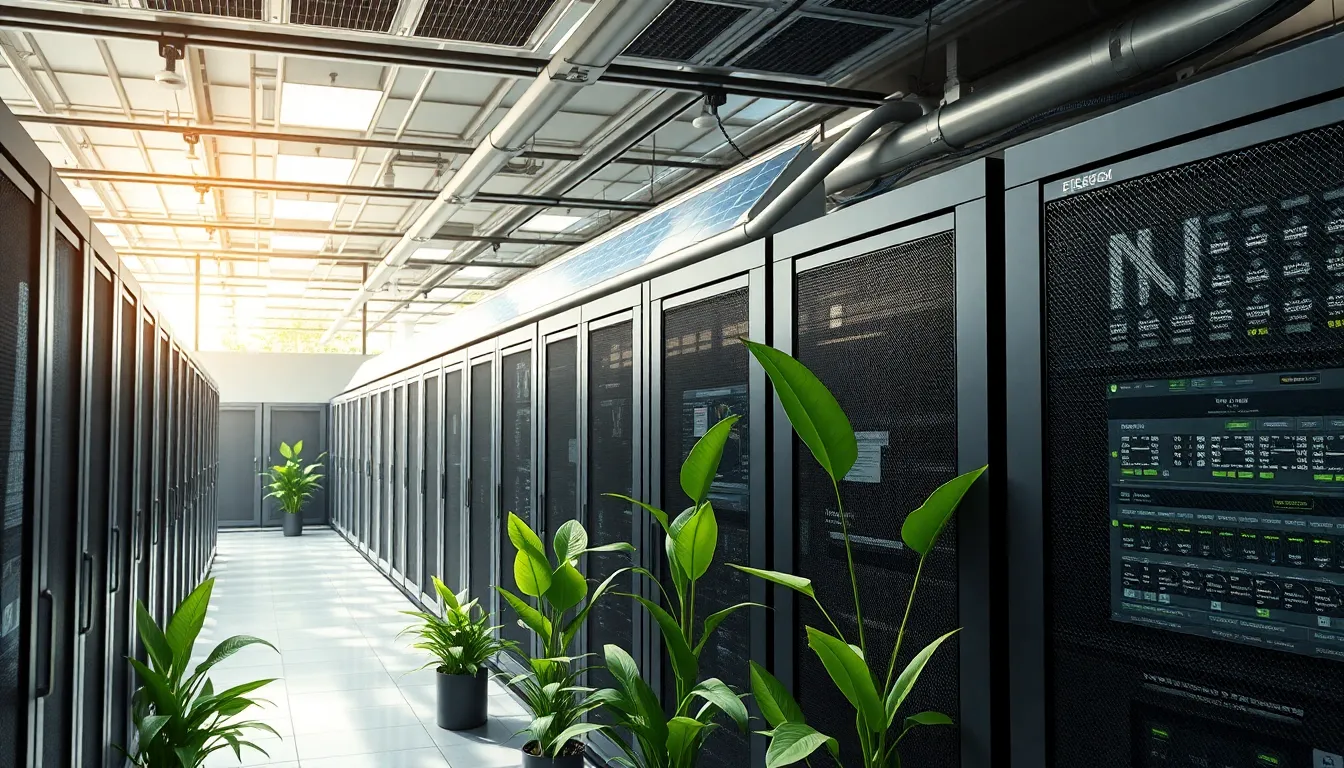Table of Contents
ToggleIn a world where data is king, it’s time to make sure our royal court is eco-friendly. Enter green data management—a savvy approach that not only keeps data organized but also helps save the planet. Imagine a data center that’s as green as your favorite salad, powered by renewable energy and designed to minimize waste. It’s not just a trend; it’s a necessity.
Overview of Green Data Management
Green data management refers to the practices and strategies aimed at minimizing environmental impact while managing data effectively. Organizations adopt these eco-friendly practices to address increasing energy demands associated with data storage and processing. Data centers consume significant energy; using renewable energy sources can drastically reduce their carbon footprint.
Implementing energy-efficient hardware plays a key role in green data management. Energy-efficient servers, storage units, and networking equipment consume less power, contributing to reduced operational costs. Companies often invest in virtualization, allowing them to consolidate resources and optimize energy usage across the data center.
Waste reduction is another critical aspect. Proper e-waste management, recycling, or repurposing obsolete equipment minimizes landfill contributions. Many organizations partner with specialized vendors to ensure environmentally sound disposal practices align with sustainability goals.
Furthermore, data management practices that prioritize efficiency can lead to lower energy consumption. Techniques such as data deduplication, compression, and tiered storage optimize storage resources while maintaining performance levels. Choosing cloud solutions powered by renewable energy can also enhance an organization’s green data management strategy.
Regulatory compliance, driven by increasing environmental awareness, influences organizations’ approaches to data management. Many firms face stricter guidelines regarding energy usage and sustainability practices. By adopting green data management, companies not only comply with regulations but also appeal to environmentally conscious consumers.
Ultimately, green data management represents a convergence of technology and sustainability. Through strategic initiatives, organizations can achieve operational efficiency while contributing to environmental preservation. Prioritizing these practices ensures organizations remain competitive and responsible in a data-driven economy.
Importance of Green Data Management

Green data management plays a crucial role in minimizing environmental harm and fostering sustainable practices. Implementing eco-friendly strategies not only supports the planet but also shapes organizational success.
Environmental Impact
Green data management significantly reduces the carbon footprint of data centers. Emphasizing renewable energy sources, organizations can drastically decrease greenhouse gas emissions. Waste reduction practices, such as recycling e-waste, further contribute to lowering environmental impact. Adopting energy-efficient hardware lessens energy consumption while maintaining data integrity. Each step taken towards sustainability within data management showcases a commitment to protecting natural resources.
Economic Benefits
Green data management delivers notable economic advantages alongside environmental perks. Lower energy bills result from utilizing energy-efficient technologies in data centers. Organizations benefit from reduced operational costs due to streamlined processes and resource optimization. Compliance with emerging sustainability regulations avoids potential fines and fosters positive public relations. Companies can attract environmentally conscious consumers, enhancing market competitiveness while aligning with ethical practices.
Strategies for Implementing Green Data Management
Implementing green data management involves leveraging various strategies that contribute to both environmental sustainability and operational efficiency. Focusing on data center optimization and adapting energy-efficient technologies plays a vital role.
Data Center Optimization
Optimizing data center operations minimizes resource usage and enhances sustainability. Assessing cooling systems and storage configurations can reveal opportunities for improvement. Utilizing virtualization reduces the number of physical servers needed, thus lowering energy requirements. Implementing effective airflow management strategies also aids in maintaining optimal temperatures, leading to energy savings. Regularly monitoring energy consumption allows for immediate adjustments and ongoing improvements.
Energy-Efficient Technologies
Adopting energy-efficient technologies significantly lowers power consumption in data centers. Integrating advanced server hardware can enhance performance while consuming less energy. Energy-efficient storage solutions provide ample capacity without the added burden on power resources. Transitioning to solid-state drives often yields higher energy savings compared to traditional hard drives. Implementing intelligent power management tools can optimize energy use further, aligning operational performance with sustainability goals. Overall, these technologies support a strategic shift toward greener data management practices.
Challenges in Green Data Management
Implementing green data management presents several significant challenges for organizations. Understanding these obstacles helps facilitate effective strategies for overcoming them.
Initial Costs
Investing in green data management requires substantial initial capital. Upgrading to energy-efficient hardware often entails higher upfront costs than traditional options. Companies frequently need to allocate budgets for renewable energy sources, advanced cooling systems, and energy-efficient infrastructure. Long-term savings from reduced energy bills and operational costs can offset these initial investments. Despite the economic hurdles, many organizations recognize the importance of prioritizing sustainability, which may yield competitive advantages.
Technological Limitations
Technological constraints can hinder the implementation of green data management practices. Legacy systems pose challenges in integrating newer, energy-efficient technologies. Organizations often face difficulties in optimizing existing data centers to achieve the desired sustainability levels. Compatibility issues can arise when trying to incorporate advanced solutions such as virtualization and intelligent power management tools. Despite these obstacles, continued advancements in technology promise to enhance green data management practices, enabling organizations to navigate limitations effectively.
Future Trends in Green Data Management
Emerging trends in green data management highlight the fusion of technology and environmental sustainability. Innovations are streamlining operations while promoting eco-friendly practices across the data landscape.
AI and Machine Learning
Artificial intelligence and machine learning are pivotal in optimizing resource management. These technologies analyze data usage patterns, facilitating energy savings through smarter workload distribution. Intelligent algorithms predict hardware failure, enabling proactive maintenance that extends equipment life. Efficiency increases when organizations implement these tools for cooling systems, significantly lowering energy demands. Additionally, AI helps in automating e-waste recycling processes, ensuring that electronic waste is managed responsibly. As AI and machine learning evolve, they contribute to achieving greater sustainability in data centers.
Sustainable Practices in Data Storage
Sustainable data storage practices gain traction as organizations seek to reduce their carbon footprint. Cloud storage solutions reduce the need for physical hardware, allowing for energy-efficient resource allocation. Utilizing green storage technologies, such as solid-state drives, minimizes energy consumption compared to traditional hard disks. Data archiving techniques, including tiered storage, optimize data accessibility while saving space and resources. Organizations that embrace these sustainable practices not only improve efficiency but also enhance their reputation among environmentally conscious consumers. Awareness of sustainable data storage options continues to grow, further driving the demand for green initiatives.
Embracing green data management is essential for organizations aiming to thrive in an increasingly eco-conscious marketplace. By integrating sustainable practices into their data management strategies, companies can significantly reduce their environmental impact while enhancing operational efficiency.
The shift towards renewable energy sources and energy-efficient technologies not only helps in compliance with regulations but also attracts environmentally aware consumers. As organizations navigate the challenges of implementing these practices, the long-term benefits, including cost savings and improved brand reputation, become evident.
Ultimately, prioritizing green data management positions organizations as leaders in sustainability, ensuring they contribute positively to the environment while achieving business success.




